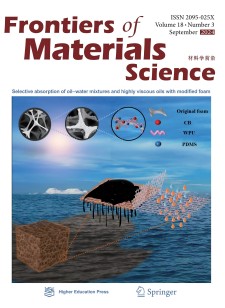SnO2 nanotubes with N-doped carbon coating for advanced Li-ion battery anodes
IF 2.3
4区 材料科学
Q3 MATERIALS SCIENCE, MULTIDISCIPLINARY
引用次数: 0
Abstract
Tin dioxide nanotubes with N-doped carbon layer (SnO2/N-C NTs) were synthesized through a MoO3 nanorod-based sacrificial template method, dopamine polymerization and calcination process. Applied to the Li-ion battery, SnO2/N-C NTs exhibited excellent electrochemical properties, with a first discharge capacity of 1722.3 mAh·g−1 at 0.1 A·g−1 and a high capacity of 1369.3 mAh·g−1 over 100 cycles. The superior electrochemical performance is ascribed to the N-doped carbon layer and tubular structure, which effectively improves the electrical conductivity of the composites, accelerates the migration of Li+ and electrons, and alleviates the volume change of the anode to a certain extent.
先进锂离子电池负极用氮掺杂碳涂层SnO2纳米管
采用基于MoO3纳米棒的牺牲模板法、多巴胺聚合和煅烧工艺合成了n掺杂碳层的二氧化锡纳米管(SnO2/N-C NTs)。应用于锂离子电池中,SnO2/N-C纳米管表现出优异的电化学性能,在0.1 a·g−1下首次放电容量为1722.3 mAh·g−1,100次循环放电容量为1369.3 mAh·g−1。优异的电化学性能归因于n掺杂碳层和管状结构,有效提高了复合材料的导电性,加速了Li+和电子的迁移,并在一定程度上缓解了阳极的体积变化。
本文章由计算机程序翻译,如有差异,请以英文原文为准。
求助全文
约1分钟内获得全文
求助全文
来源期刊

Frontiers of Materials Science
MATERIALS SCIENCE, MULTIDISCIPLINARY-
CiteScore
4.20
自引率
3.70%
发文量
515
期刊介绍:
Frontiers of Materials Science is a peer-reviewed international journal that publishes high quality reviews/mini-reviews, full-length research papers, and short Communications recording the latest pioneering studies on all aspects of materials science. It aims at providing a forum to promote communication and exchange between scientists in the worldwide materials science community.
The subjects are seen from international and interdisciplinary perspectives covering areas including (but not limited to):
Biomaterials including biomimetics and biomineralization;
Nano materials;
Polymers and composites;
New metallic materials;
Advanced ceramics;
Materials modeling and computation;
Frontier materials synthesis and characterization;
Novel methods for materials manufacturing;
Materials performance;
Materials applications in energy, information and biotechnology.
 求助内容:
求助内容: 应助结果提醒方式:
应助结果提醒方式:


